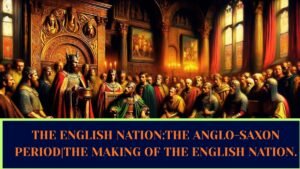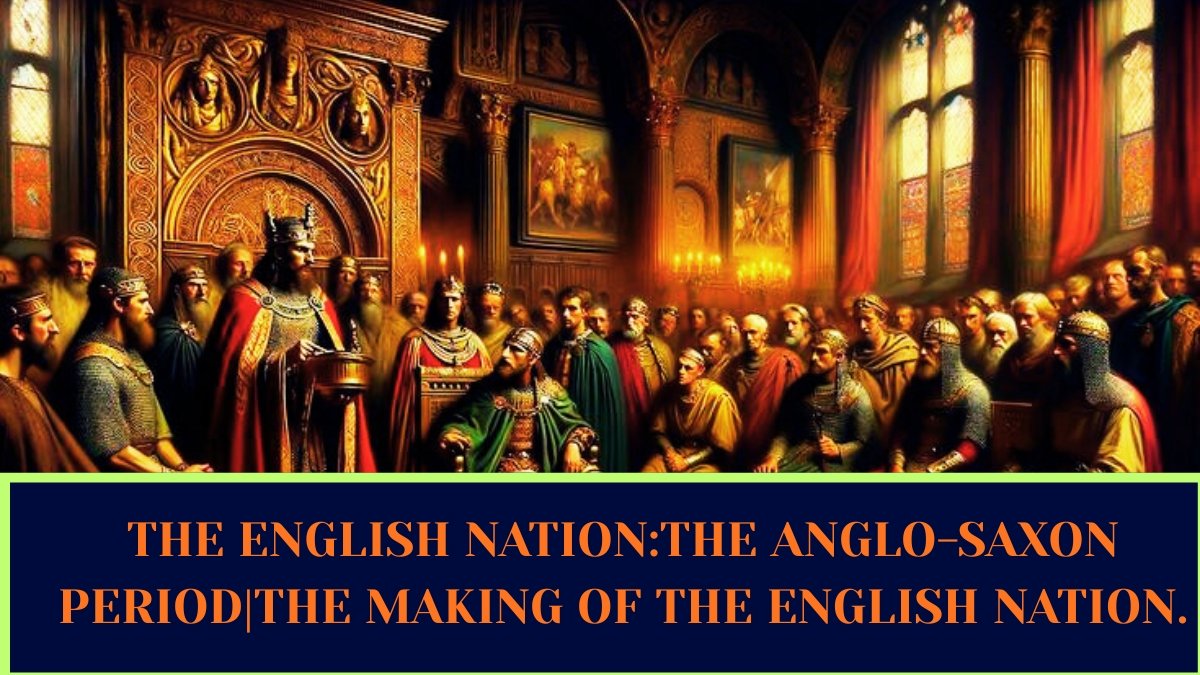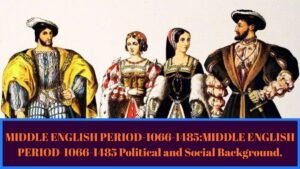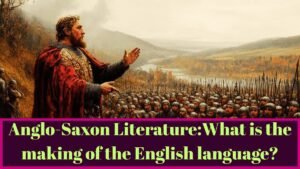THE ENGLISH NATION:THE ANGLO-SAXON PERIOD|THE MAKING OF THE ENGLISH NATION.

THE ENGLISH NATION:These are the Heroes who despise the Dutch, And rail at new-come Foreigners so much; Forgetting that themselves are deriv’d From the most Scoundrel Race that ever lived, A horrid Crowd of Rambling Thieves and Drones, Who ransack’d Kingdonis, and dispeopled Towns; The Pict and Painted Britain, Treach’ious Scot By Hunger, Theft, und Rapine, hither brought; Norwegian Pirates, Buccaneering Danes. Whose Red-hair’d Offspring ev’ry where remains; Who join’d with Norman-French compound the Breed From whence your Truc-Born Englislimen proceed. (-Deniel Defoe: The True-Born Englishman, 1701)
What is the history of the Kingdom of England?
The English a composite race-Celts and Teutons-Celts of France-Celts of Ireland and Scotland (Gaels)-Celts of England (Britons) Britain conquered by Rome-Roman withdrawal from Britain and its conquest by Anglo-Saxons (Teutons)-Their conversion to Christianity and Civilisation-Anglo-Saxon Kingdoms-Alfred the Great-Invasion by Scandinavians and their ultimate absorption by Anglo-Saxons-Edward the Confessor and Harold-The Nor-man Conquest-The making of English language-The English character.
In order to understand the history of English literature it is essential to know something about the people who have produced that literature. The English are a composite race, because various racial elements have entered into their making: Celts, Anglo-Saxons. Danes, Normans. The Celtic people were different from the other three peoples who were essentially of the same kindred of Teutonic stock. As the Celts were practically displaced by the Teutons, the Englishman of today is essentially Teutonic in charac-ter tempered by Celtic. The Celtic strain is stronger in Scotland,
and is dominant in Wales, for the Welsh are the only true descen-dants of ancient Celts.
Now let us consider briefly each of these four peoples whose mixing together has produced the English nation.
Who is the founder father of English?

The Celts (pronounced Selts, also Kelts) were a branch of Indo-Europeans that had settled in Western Europe including Italy. France and Spain, as early as the sixth or seventh century B.C. The Celts of Gaul (France) called Galli were conquered by Julius Caesar and were absorbed by the Romans. These Romanised Galli were conquered and absorbed by the Franks, a group of barbaric Germanic tribes, towards the end of the fifth century A.D. after the fall of the western half of the Roman Empire. Clovis, the first King of United Franks, adopted Christianity along with his subjects. He is generally regarded as the founder of the French nation. The important point to remember is that France is thus both German and Roman, the Roman predominating.
The Celts of Ireland, the Gaels, were perhaps the first occupants of a large part of England, but were later driven west into Ireland and north into Scotland by another group of Celts, the Brythons or Britons, probably a spill over from France. The Gaels lived relati-vely undisturbed in Ireland until the invasion of Scandinavian Vikings or Norsemen in the ninth and tenth centuries. The Scandi-navians were defeated by the Irish in 1014 and were absorbed by the Gaels.
The Irish were converted to Christianity about the middle of the fifth century by St. Patrick, a Christian Briton taken prisoner by the Irish raiders after the Roman withdrawal from Britain early in the fifth century. He became the patron saint of Ireland. His missionaries carried the torch of Irish Christianity to England. The earliest Irish poetry dates from the time of St. Patrick. Literary activity came to an end after the conquest of Ireland by Henry II in 1182. Since then there has been little of interest in Irish literature until the Celtic Revival in the beginning of this century in the work of poets and playwrights like W.B. Yeats and J.M. Synge. Ireland remained under English rule until she became in 1937 an indepen-dent State under the name ‘Eire’.
The Celts of England, Brythons or Britons, after driving out the Gaels occupied the southern half of the island. Their history begins with the Roman invasions under Julius Caesar. When Caesar was subduing Gaul, the Britons of England sent aid to the Galli, their cousins of Gaul. Caesar thereupon invaded England (B.C. 55) just to punish the allies of the conquered Gaul, but did not penetrate deep into the country. His expedition was exploratory and was followed by another next year (B.C. 54). This also was not a success and it was not until the reign of Claudius a century later that Britain was finally conquered by the Romans (43 A.D.). The Romans conquered Britain. but did not push north into Scotland.
In order to defend their northern frontiers against the Picts (Painted men) and Scots, they built a wall, called Hadrian’s Wall (after the emperor Hadrian) which ran from coast to coast. Parts of this wall still exist. Under the Roman rule Britain was converted to Chris-tianity and otherwise Romanized. The Romans built roads, Villas and baths and made London an important trading centre. But when in the fifth century the German barbarians threatened the frontiers of the Roman Empire, the Roman legions in occupation of Britain were withdrawn for service at home, and the island was left defenceless. When the Romans withdrew, they left nothing behind except a few roads and names of towns. It is a curious fact of history that while France and Spain became Roman in language and culture, four centuries of Roman rule did not leave any permanent mark of Latın civilisation on Britain. The Latin language, Roman art and culture disappeared without a trace. The later Latin influ-ence in English language and literature came through the Normans.
The Roman occupation, the long peace and the benefits of civilised life had made the Britons too soft and unwarlike to resist the fierce invaders that began to pour into Britain after the with-drawal of the Roman armies (410 A.D.). The first invasion took place in the middle of the fifth century to be followed by others till the end of the sixth century. Most of the Britons were extermina-ted, others retreated to Cornwall, Wales and Strathclyde (the north-west coast of Scotland between the Ribble and the Clyde), and some migrated to Armorica, later called Brittany (Fr. Bretagne), the north-west peninsula of France. In lower Brittany, a language similar to Welsh is still spoken. Ironically the Britons, the original inhabitants were called ‘Welsh’ or ‘foreigners’ by their conquerors.
The Britons of Wales have a distinctive language and culture which have had little influence on English literature beyond fur-nishing the tales of Arthur, traditionally believed to have been the last king of Britain before the coming of the Anglo-Saxons.
The pre-Christian Celts were a barbarous people with a pri-mitive pagan religion dominated by priests, the Druids. In spite of their barbarity, however, the Celts were romantic, and humorous. They were certainly less grim and gloomy than the mantic, mystery loving, Anglo-Saxons. Being a visionary and impractical people they did not achieve any important political status in Europe.
The invaders Angles, Saxons and Jutes-came from their home-land along the northern shores of Germany. They were Low German tribes allied in race and language. They were barbarians who worshipped heathen gods. Some of the days of the week are named after them Wednesday (after Woden), Thursday (after Thor), Tuesday (after Tiw) and Friday (after the goddess Friga). They were merciless in war, hated towns and lived in wooden huts. The Jutes who came first under their leaders Hengist and Horsa in 450 A.D. settled in Kent to be followed by Saxons south and west. The Angles settled along the eastern coast and being the most numerous gave their name to the whole country-Angle-land or England. The conquest was completed by the end of the sixth century. Many ny petty Kingdoms were set up, all fighting with one another. The Anglo-Saxon Kingdoms that assumed importance in the seventh and eighth hth centuries centuri were: Northumbria in the north, Mercia in the centre; Wessex in the south and Anglia in the east. The names of Saxon Kingdoms remain to this day in Essex (East Saxons), Wessex (West Saxons), Middlesex (Middle Saxons) and Sussex (South Saxons). In Norfolk (North folk) and Suffolk (South folk) we have place names of the Angles of the east coast.
Their language was a Low German dialect i.e., a branch of the West Germanic language. It was a highly inflected language like modern German, Sanskrit or Latin with complicated case endings and elaborate gender. The case-endings have in course of time disappeared, their place being taken by prepositions. The gram-matical gender of Anglo-Saxon has been replaced in modern English by the much simpler gender based on sex: masculine, feminine and neuter.
or The first step that put the Anglo-Saxons on the path of civilisation was their conversion to Christianity. Their Celtic neighbours of Wales hated them too much to Christianise them. They were converted to Christianity by Roman and Irish mission-aries in the seventh century. A band of missionaries under St. Augustine arrived in Kent in 597. They were well received by the ruler who allowed them to build their first Cathedral in Canterbury. The King embraced Christianity and permitted the missionaries to preach freely. Christianity came to the north of England a generation later through the Irish missions of St. Patrick and St. Columba. The missionaries spread not only Christianity among the people, they also introduced the Roman alphabet which replaced the ‘runes’ or stone-the only symbolic cuts and scratches on wood writing known to Anglo-Saxons. This was a very important step for the development of English literature. With this new facility at hand, the ‘runes’ were turned to letters, giving us the old (conti-nental) Anglo-Saxon stories like Beowulf for the first time in civili-sed form. It also opened the way for the production of English literature on English soil-in the writings of Caedmon and Cynewulf. Canterbury in the south, York and Jarrow in the north became great centres of Christian and secular learning in the seventh and eighth centuries. The three great scholars who achieved European fame were: Theodore of Tarsus (a Greek of Tarsus in Asia Minor) archbishop of Canterbury, Bede, the Venerable Bede of Jarrow, and Aleuin of York who was invited by Charlemagne to educate the people of his empire. This glorious period of English learning, however, did not last long, for England was invaded in the last years of the eighth century by Norsemen or Scandinavians from Norway, Sweden and Denmark. They were all called Danes by the English. They were pirates and plunderers and were hardier and fiercer than the Anglo-Saxons, who because of their disunity were no match for them. They carried fire and sword everywliere destroying churches, monasteries, schools and libraries. Soon the whole of England was overrun except the south where Alfred the Great, King of Wessex made a stout resistance. The Danes were defeated in 878 and made peace promising to become Christians and leaving the south and west to Alfred. They retained the north and east of England, which was called the Danelaw.




